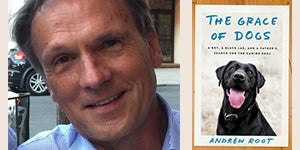Talking About THE GRACE OF DOGS, Pt. 2: Convergent’s David Kopp on The Making of a Tail Wagger
 David Kopp, Vice President, Executive Editor, Convergent Books, edited Andrew Root’s book, THE GRACE OF DOGS, and was instantly drawn into this engaging story – a heart-warming, enlightening read for anyone who has ever owned, loved and lost a dog, and who wanted to further explore the full scope of the human-dog relationship, including “how our dogs shape us, and how they serve as ‘teachers,’ of sorts.”
David Kopp, Vice President, Executive Editor, Convergent Books, edited Andrew Root’s book, THE GRACE OF DOGS, and was instantly drawn into this engaging story – a heart-warming, enlightening read for anyone who has ever owned, loved and lost a dog, and who wanted to further explore the full scope of the human-dog relationship, including “how our dogs shape us, and how they serve as ‘teachers,’ of sorts.”
Mr. Kopp worked closely with Dr. Root, shepherding this project from proposal to finished book. Here David offers thoughtful responses to questions about the editor/author process and what separates this book from the pack.
What distinguishes THE GRACE OF DOGS from the scores of dog books that are on the market now?
We wanted to take this tail wagger of a book home the moment we saw the proposal. Here was a dog lover, dad and seminary prof who wanted to explore the deep and even unique connections many of us feel with our dogs. We particularly loved that Andy oriented his scholarly narrative in his own deeply felt experience. For example, he opens his story with a scene that many can relate to—a room at the vet’s office, where he and his family are gathered to say tearful goodbyes to a beloved family member—Kirby, their faithful Black Lab. Just before they head home, eight-year-old Owen spontaneously enacts a surprising ritual. He kneels, lays a doggie treat on Kirby’s now lifeless body, and then, dipping his finger in a paper cup of water, reverently makes the sign of the cross on Kirby’s forehead. “That’s the moment,” Root writes, “that I couldn’t shake.”
Great news for readers that he couldn’t! From there the author sets about to explore questions like: What in the world just happened here? A child intuiting a shared spiritual connection with a dog? If a dog is nothing more than a furry object, why did my son’s sacramental act feel so appropriate? And why did the loss of Kirby hurt so bad?
There have been a lot of books exploring our relationship with dogs on the level of science or everyday experience, but Andy’s book was the first we’d seen that tapped into the spiritual component of that relationship in such a satisfying way. He explores the meaning of spirit and soul as well as the mutually beneficial evolutionary development of dog and humans. And he tackles the kitchen table questions that kids ask, most notably: Do dogs go to heaven? (Spoiler alert: yes.) But deeper than that, he shows how our dogs shape us, and how they serve as “teachers” of sorts for the best faith has to offer—reminding us that we are worthy of receiving unconditional love and capable of extending it to others.
How would you describe the editor/author process and experience of working with Andrew?
Andy is a theologian by training, but he draws on so many threads in this book: neuroscience, history, the writings of serious religious thinkers like John Calvin and Dietrich Bonhoeffer, and of course, the story of Andy’s family and their black lab. All to say he brought of a lot of soul to his writing. Our main task with Andy was finding a way to unspool his argument in a way that would feel like a reading adventure to the average reader—not, in other words, like a scholar building a case for his premise. And of course we wanted to wrap all his thoughtful research into a heartwarming read that captures the magic we sense when we spend time with our dogs. Fortunately, Andy brought consummate skills as story teller, thinker, entertainer, dad and dog lover to the task.
In keeping with our editorial vision at Convergent, we all wanted to deliver a non-religious but spiritually-informed conversation to readers in the general market. So, for example, we didn’t think readers would care about proving spirituality for spirituality’s sake, or for that matter, using chapter and verse to “prove” a particular point of view. We knew they would be reading THE GRACE OF DOGS with their own pet in mind—their own wonderings about why their dog-human relationship feels (or felt) so unique, and can go so deep. We figured readers simply want more insight into perhaps that persistent feeling that their relationship with their dog is or was something more than the material, something mysterious, and something that makes life more worth living. You don’t really need to use the word “spiritual” to accomplish that.
